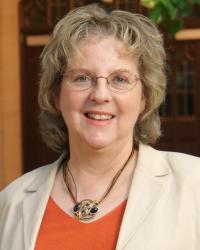Leadership for change. Virtual environments. Real accomplishment.

Dean
Catherine Emihovich
I’m pleased to announce that the Office of News and Publications has finished the 2006 – 2007 annual report for the College of Education. This new publication format highlights major college initiatives, faculty/student awards, and donor gifts in a very media-friendly and compact way. We will be distributing this report to college administrators across the country, since data for the next set of US News & World Report rankings of best graduate schools are now being compiled. While many of us may deplore this endless quest for increased rankings, we can’t afford to ignore their importance in showcasing our work and increasing student recruitment.
The overriding theme of this report is leadership for change, a necessity in a world where change is constant and institutions that don’t rapidly adapt find themselves at a serious competitive disadvantage. I have always been struck by the paradox that higher education is the place where 21st century knowledge is produced, yet the operational processes and procedures are very much rooted in an institutional structure inherited from the 19th century. The same paradox holds true at the K-12 level; we educate children to adapt to a modern global environment, yet classrooms and teaching practices are still remarkably similar to those found in schools at the beginning of this century.
What will radically change practices across the educational spectrum is the increased use of Web-based technologies to deliver high-quality instruction in multiple modes to a wide variety of learners. These changes have not been overlooked in our college: Faculty are taking a national leadership role in the field of educational technology and virtual schooling, and are pioneering innovative models of professional development through our online job-embedded master’s degree program, and the LEAD (Leadership in Educational Administration Doctorate) doctoral program. Rick Ferdig, an associate professor in the School of Teaching and Learning, recently returned from a conference sponsored by the National Council of Online Learning (NACOL) and reported that many people widely regard the University of Florida as a “virtual school powerhouse.”
Expanding our presence in this area depends critically upon having appropriate space and the most up-to-date technology. For these reasons, building the new educational technology annex to Norman Hall, which will be called the Experiential Learning Complex (ELC), is the primary goal for our UF Capital Campaign. The ELC will serve the entire campus as a place where faculty and students can experiment with virtual teaching techniques, and will provide space for fully equipped immersive classrooms and research offices where cognitive studies of the effects of technology on learning will be conducted. Students will be able to create virtual worlds in which they can test ideas and concepts, or practice tasks in a qualitatively different medium not unlike the worlds currently found in interactive games. Although educators have been slow to embrace the concept of ‘serious gaming,’ teaching today’s youth who have grown up with computers requires an entirely new approach to instruction. If we succeed in establishing this new complex, the image of schooling that has stubbornly persisted for over 100 years will be radically and fundamentally altered consistent with the way today’s students prefer to learn through media. Yesterday – the little red schoolhouse; tomorrow – the school of the mind. The educational possibilities are limited only by our imagination of the future.
— Dean Catherine Emihovich




